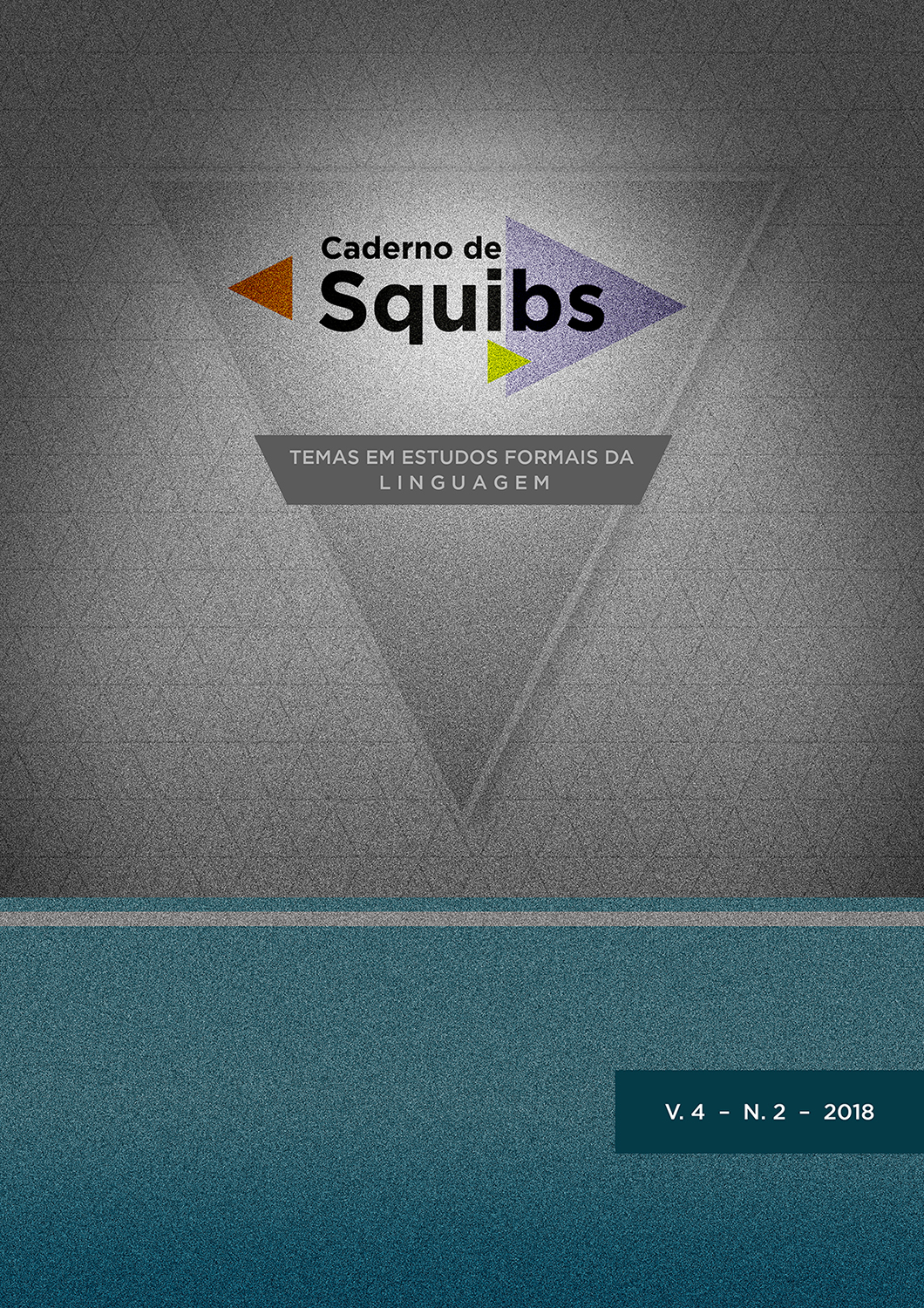Drops de Semântica: de onde vieram e para onde vão as âncoras?
Conteúdo do artigo principal
Resumo
Este trabalho se propõe a discutir os fundamentos de uma ferramenta semântica atualmente muito discutida em teoria e análise linguística, sobretudo na Semântica de Mundos Possíveis, notadamente as âncoras ou a noção/processo de ancoragem em si. Tratando-se de um squib, três seções muito sucintas compõem a sua arquitetura, sendo: a) caracterização do problema, identificando o surgimento da noção de âncora na literatura; b) relevância dessa ferramenta no cenário lógico-linguístico, associando-a a duas outras propriedades de caráter semântico, neste caso i) deslocamento e ii) aboutness; e c) desdobramentos e perspectivas acerca desse recorte, sugerindo alguns insights advindos da descrição de dados do português brasileiro, sobretudo em relação aos fenômenos de i) operadores-monstros e ii) atitudes proposicionais.
Downloads
Detalhes do artigo
Autorizo a publicação de squib/artigo de minha autoria e inteira responsabilidade para publicação.
I authorize the publication of the squib/paper of my authorship and full responsibility for publication.
Referências
AIKHENVALD, A. Y. Evidentiality in typological perspective. In: AIKHENVALD, A. Y.; DIXON, R. M. W. (ed.). Studies in evidentiality. Typological studies in language. v. 54. Amsterdam: John Benjamins Publishing Company, 2003. p. 1-33.
AIKHENVALD, A. Y. Evidentiality. Oxford: Oxford University Press, 2004.
ARREGUI, A. When aspect matters: the case of “would” conditionals. Natural Language Semantics, v. 15, p. 221-264, 2007.
ARREGUI, A. On similarity in counterfactuals. Linguistics and Philosophy, v. 32, n. 3, p. 245-278. 2009.
CONDORAVDI, C. Temporal interpretation of modals. BEAVER, D. et al. (ed.). Stanford Papers in Semantics, CSLI Publications, Palo Alto, p. 59-88, 2001.
CRESSWELL, M. J. Structured meanings: the semantics of propositional attitudes. Cambridge: Bradford, 1985.
FALLER, M. Evidential Scalar Implicatures. Linguistics and Philosophy, v. 35, p. 285-312, 2012.
FERREIRA, M. Alçamento temporal em complementos infinitivos do português. Cadernos De Estudos Lingüísticos, v. 62, 2020.
HACQUARD, V. Aspects of Modality. Ph.D. Dissertation. Massachusetts Institute of Technology, 2006.
KAPLAN, D. Demonstratives: An Essay on the Semantics, Logic, Metaphysics, and Epistemology of Demonstratives and Other Indexicals. In: ALMOG, J.; PERRY, J.; WETTSTEIN, H. (ed.). Themes from Kaplan. New York: Oxford University Press, 1989. p. 481-563.
KARTTUNEN, L. Possible and must. KIMBALL, J. (ed.). Syntax and Semantics, v. 1. Cambridge: Academic Press, 1972.
KRATZER, A. What “must” and “can” Must and Can Mean. Linguistics and Philosophy, p. 337-355, 1977.
KRATZER, A. The notional category of modality. In: EIKMEYER, H. J.; RIESER, H. (ed.). Worlds, Words, and Contexts. Berlín: de Gruyter, 1981. p. 38-74.
KRATZER, A. Modality. In: von STECHOW, A.; WUNDERLICH, D. (ed.). Semantics: An International Handbook of Contemporary Research, 1991. p. 639-650.
KRATZER, A. Modality for the 21st Century. 19th International Congress of Linguists. Geneva, 2013. p. 181-201.
KRATZER, A. Where does modality come from? 3rd EISSI (lecture). Florianópolis: Universidade Federal de Santa Catarina, 2018.
KRATZER, A.; OLIVEIRA, R. P.; PESSOTTO, A. L. Talking about modality ”“ an interview with Angelika Kratzer. ReVEL, especial issue 8, p. 8-20, 2014.
KRIPKE, S. Naming and necessity. Oxford: Basil Blackwell, 1980.
LACA, B. Epistemic modality and temporal anchoring. ReVEL, special issue 8, p. 76-105, 2014.
LEWIS, D. Finkish Dispositions. The Philosophical Quarterly, v. 47, n. 187, p. 143-58, 1997.
MATTHEWSON, L.; RULLMANN, R.; DAVIS, H. Evidentials as Epistemic Modals: evidence from St’át’imcets. The Linguistic Variation Yearbook v. 7, p. 201-54, 2007.
OLIVEIRA, R. P. A study on the semantics of Portuguese imperfective modals in epistemic contexts. Revista Letras, Curitiba, UFPR, n. 99, p. 58-74, jan./jun. 2019.
RIZZI, L. On some properties of subjects and topics. In: BRUGÉ, L.; GIUSTI, G.; MUNARO, N., SCHWEIKERT, W.; TURANO, G. (ed.). Proceedings of the XXX Incontro di Grammatica Generativa, p. 203-224. Venezia: Cafoscarina, 2005.
RIZZI, L. On the form of chains: criterial positions and ECP effects. In: CHENG, L.; CORVER, N. (ed.). On wh movement. Cambridge, MA: MIT Press, 2006. p. 97-133.
RIZZI, L. Notes on labeling and subject positions. In: Di DOMENICO, E.; HAMANN, C.; MATTEINI, S. (ed.). Structures, strategies and beyond ”“ Studies in honour of Adriana Belletti. Amsterdam: John Benjamins, 2015. p. 17-46.
TEIXEIRA, L. R.; BASSO, R. M. Definindo um operador-monstro. Alfa, n. 59, v. 2, p. 309-334, 2015. Disponível em: http://dx.doi.org/10.1590/1981-5794-1504-4. Acesso em: 01 jan. 2018.
von FINTEL, K.; HEIM, I. Intensional Semantics. Cambridge: MIT, 2010.
von FINTEL, K.; GILLIES, A. Must... Stay... Strong! Natural Language Semantics, v. 18, n. 4, p. 351-383, dez. 2010.
